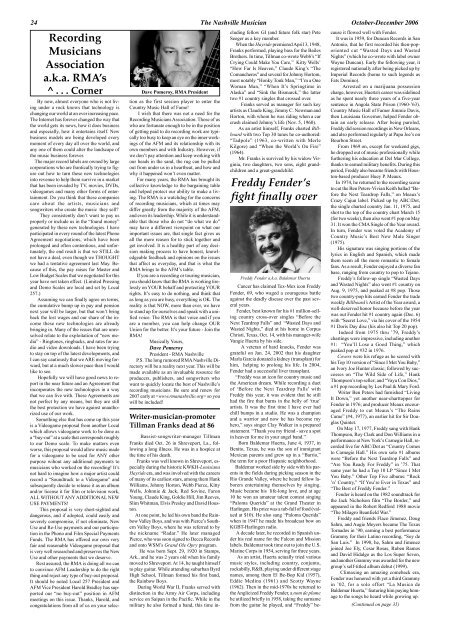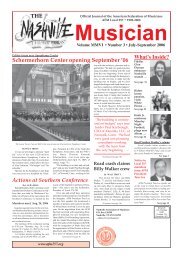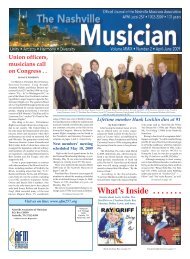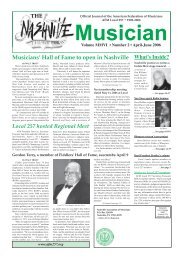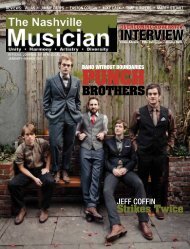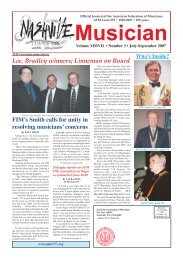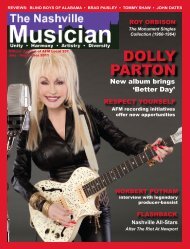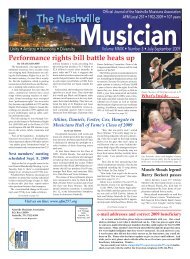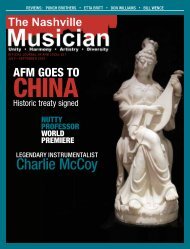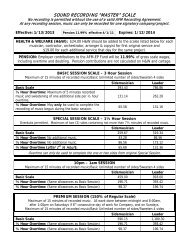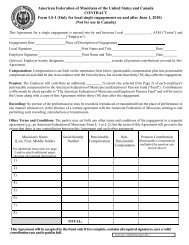Musicians Web pages - Nashville Musicians Association
Musicians Web pages - Nashville Musicians Association
Musicians Web pages - Nashville Musicians Association
- No tags were found...
Create successful ePaper yourself
Turn your PDF publications into a flip-book with our unique Google optimized e-Paper software.
24 The <strong>Nashville</strong> Musician October-December 2006<br />
Recording<br />
<strong>Musicians</strong><br />
<strong>Association</strong><br />
a.k.a. RMA’s<br />
^ . . . Corner Dave Pomeroy, RMA President<br />
By now, almost everyone who is not living<br />
under a rock knows that technology is<br />
changing our world at an ever increasing pace.<br />
The Internet has forever changed the way that<br />
the world gets its news, how it does business<br />
and especially, how it entertains itself. New<br />
business models are being developed every<br />
moment of every day all over the world, and<br />
any one of them could alter the landscape of<br />
the music business forever.<br />
The major record labels are owned by large<br />
corporations who are frantically trying to figure<br />
out how to turn these new technologies<br />
into revenue to help them survive in a market<br />
that has been invaded by TV, movies, DVDs,<br />
videogames and many other forms of entertainment.<br />
Do you think that these companies<br />
care about the artists, musicians and<br />
songwriters who create the music they sell?<br />
They consistently don’t want to pay us<br />
properly or include us in the “found money”<br />
generated by these new technologies. I have<br />
participated in every round of the latest Phono<br />
Agreement negotiations, which have been<br />
prolonged and often contentious, and unfortunately,<br />
the end result is that we STILL do<br />
not have a deal, even though we THOUGHT<br />
we had a tentative agreement last May. Because<br />
of this, the pay raises for Master and<br />
Low Budget Scales that we negotiated for this<br />
year have not taken effect. (Limited Pressing<br />
and Demo Scales are local and set by Local<br />
257.)<br />
Assuming we can finally agree on terms,<br />
the cumulative bump up in pay and pension<br />
next year will be larger, but that won’t bring<br />
back the lost wages and our share of the income<br />
these new technologies are already<br />
bringing in. Many of the issues that are unresolved<br />
relate to the exploitation of “new media”<br />
- Ringtones, ringbacks, and rates for audio<br />
and video downloads. I have been trying<br />
to stay on top of the latest developments, and<br />
I can say cautiously that we ARE moving forward,<br />
but at a much slower pace than I would<br />
like to see.<br />
Hopefully we will have good news to report<br />
in the near future and an Agreement that<br />
incorporates the new technologies in a way<br />
that we can live with. These Agreements are<br />
not perfect by any means, but they are still<br />
the best protection we have against unauthorized<br />
use of our work.<br />
Something else that has come up this year<br />
is a Videogame proposal from another Local<br />
which allows videogame work to be done as<br />
a “buy-out” at a scale that corresponds roughly<br />
to our Demo scale. To make matters even<br />
worse, this proposal would allow music made<br />
for a videogame to be used for ANY other<br />
purpose wihout any additional payments to<br />
musicians who worked on the recording! It’s<br />
not hard to imagine how a major artist could<br />
record a “Soundtrack to a Videogame” and<br />
subsequently decide to release it as an album<br />
and/or license it for film or television work,<br />
ALL WITHOUT ANY ADDITIONAL NEW<br />
USE PAYMENTS!<br />
This proposal is very short-sighted and<br />
dangerous, and if adopted, could easily and<br />
severely compromise, if not eliminate, New<br />
Use and Re-Use payments and our participation<br />
in the Phono and Film Special Payments<br />
Funds. The RMA has offered our own very<br />
fair and reasonable Videogame proposal that<br />
is very well researched and preserves the New<br />
Use and other payments that we deserve.<br />
Rest assured, the RMA is doing all we can<br />
to convince AFM Leadership to do the right<br />
thing and reject any type of buy-out proposal.<br />
It should be noted Local 257 President and<br />
AFM Vice President Harold Bradley has supported<br />
our “no buy-out” position in AFM<br />
meetings on this issue. Thanks, Harold, and<br />
congratulations from all of us on your selec-<br />
tion as the first session player to enter the<br />
Country Music Hall of Fame!<br />
I wish that there was not a need for the<br />
Recording <strong>Musicians</strong> <strong>Association</strong>. Those of us<br />
who are fortunate enough to be in the position<br />
of getting paid to do recording work are typically<br />
too busy to keep an eye on the inner workings<br />
of the AFM and its relationship with its<br />
own members and with Industry. However, if<br />
we don’t pay attention and keep working with<br />
our heads in the sand, the rug can be pulled<br />
out from under us in a heartbeat, and how and<br />
why it happened won’t even matter.<br />
For many years, the RMA has brought its<br />
collective knowledge to the bargaining table<br />
and helped protect our ability to make a living.<br />
The RMA is a watchdog for the concerns<br />
of recording musicians, which at times may<br />
differ greatly from the majority of the AFM,<br />
and even its leadership. While it is understandable<br />
that those who do not “do what we do”<br />
may have a different viewpoint on what our<br />
important issues are, that single fact gives us<br />
all the more reason for to stick together and<br />
get involved. It is a healthy part of any decision<br />
making process to have honest, knowledgeable<br />
feedback and opinions on the issues<br />
that affect us everyday, and that is what the<br />
RMA brings to the AFM’s table.<br />
If you are a recording or touring musician,<br />
you should know that the RMA is working tirelessly<br />
on YOUR behalf and protecting YOUR<br />
rights. It’s easy to do nothing, and think that<br />
as long as you are busy, everything is OK. The<br />
reality is that NOW, more than ever, we have<br />
to stand up for ourselves and speak with a unified<br />
voice. The RMA is that voice and if you<br />
are a member, you can help change OUR<br />
Union for the better. It’s your future - Join the<br />
RMA!<br />
Musically Yours,<br />
Dave Pomeroy<br />
President - RMA <strong>Nashville</strong><br />
P.S. The long rumored RMA <strong>Nashville</strong> Directory<br />
will be a reality next year. This will be<br />
made available as an invaluable resource for<br />
producers, publishers, and songwriters who<br />
want to quickly locate the best of <strong>Nashville</strong>’s<br />
recording musicians. Be sure and renew for<br />
2007 early at so you<br />
will be included!<br />
Writer-musician-promoter<br />
Tillman Franks dead at 86<br />
Bassist-songwriter-manager Tillman<br />
Franks died Oct. 26 in Shreveport, La., following<br />
a long illness. He was in a hospice at<br />
the time of his death.<br />
Franks was well known in Shreveport, especially<br />
during the historic KWKH-Louisiana<br />
Hayride era, and was involved with the careers<br />
of many of its earliest stars, among them Hank<br />
Williams, Johnny Horton, <strong>Web</strong>b Pierce, Kitty<br />
Wells, Johnnie & Jack, Red Sovine, Faron<br />
Young, Claude King, Goldie Hill, Jim Reeves,<br />
Slim Whitman, Elvis Presley and David Houston.<br />
At one point, he led his own band the Rainbow<br />
Valley Boys, and was with Pierce’s Southern<br />
Valley Boys, where he was referred to by<br />
the nickname “Radar.” He later managed<br />
Pierce, who was soon signed to Decca Records<br />
and onto WSM’s Grand Ole Opry program.<br />
He was born Sept. 29, 1920 in Stamps,<br />
Ark., and he was 2 years old when his family<br />
moved to Shreveport. At 14, he taught himself<br />
to play guitar. While attending suburban Byrd<br />
High School, Tillman formed his first band,<br />
the Rainbow Boys.<br />
During World War II, Franks served with<br />
distinction in the Army Air Corps, including<br />
service on Saipan in the Pacific. While in the<br />
military he also formed a band, this time in-<br />
cluding fellow GI (and future folk star) Pete<br />
Seeger as a key member.<br />
When the Hayride premiered April 3, 1948,<br />
Franks performed, playing bass for the Bailes<br />
Brothers. In time, Tillman co-wrote <strong>Web</strong>b’s “If<br />
Crying Could Make You Care,” Kitty Wells’<br />
“How Far Is Heaven,” Claude King’s “The<br />
Comancheros” and several for Johnny Hortom,<br />
most notably “Honky Tonk Man,” “I’m a One<br />
Woman Man,” “When It’s Springtime in<br />
Alaska” and “Sink the Bismarck,” the latter<br />
two #1 country singles that crossed over.<br />
Franks served as manager for such key<br />
artists as Claude King, Jimmy C. Newman and<br />
Horton, with whom he was riding when a car<br />
crash claimed Johnny’s life (Nov. 5, 1960).<br />
As an artist himself, Franks charted Billboard<br />
with two Top 30 tunes he co-authored:<br />
“Tadpole” (1963, co-written with Merle<br />
Kilgore) and “When the World’s On Fire”<br />
(1964).<br />
Mr. Franks is survived by his widow Virginia,<br />
two daughters, two sons, eight grandchildren<br />
and a great-grandchild.<br />
Freddy Fender’s<br />
fight finally over<br />
Freddy Fender a.k.a. Baldemar Huerta<br />
Cancer has claimed Tex-Mex icon Freddy<br />
Fender, 69, who waged a courageous battle<br />
against the deadly disease over the past several<br />
years.<br />
Fender, best known for his #1 million-selling<br />
country cross-over singles “Before the<br />
Next Teardrop Falls” and “Wasted Days and<br />
Wasted Nights,” died at his home in Corpus<br />
Christi, Texas, Oct. 14, with his manager-wife<br />
Vangie Huerta by his side.<br />
A veteran of hard knocks, Fender was<br />
grateful on Jan. 24, 2002 that his daughter<br />
Marla Garcia donated a kidney (transplant) for<br />
him, helping to prolong his life. In 2004,<br />
Fender had a successful liver transplant.<br />
“Freddy was an icon for country music and<br />
the American dream. While recording a duet<br />
of ‘Before the Next Teardrop Falls’ with<br />
Freddy this year, it was evident that he still<br />
had the fire that burns in the belly of ‘true’<br />
artists. It was the first time I have ever had<br />
chill bumps in a studio. He was a champion<br />
and a warrior and now he has become my<br />
hero,” says singer Clay Walker in a prepared<br />
statement. “Thank you my friend - save a spot<br />
in heaven for me in your angel band.”<br />
Born Baldemar Huerta, June 4, 1937, in<br />
Benito, Texas, he was the son of immigrant<br />
Mexican parents and grew up in a “Barrio,”<br />
the term for a poor Hispanic neighborhood.<br />
Baldemar worked side by side with his parents<br />
in the fields during picking season in the<br />
Rio Grande Valley, where he heard fellow laborers<br />
entertaining themselves by singing.<br />
Music became his life-long love, and at age<br />
10 he won an amateur talent contest singing<br />
“Paloma Querida” at the Grand Theater in<br />
Harlingen. His prize was a tub-full of food (valued<br />
at $10). He also sang “Paloma Querida”<br />
when in 1947 he made his broadcast bow on<br />
KGBT-Harlingen radio.<br />
A decade later, he recorded in Spanish under<br />
his real name for the Falcon and Mission<br />
labels. Baldemar took time out to join the U.S.<br />
Marine Corps in 1954, serving for three years.<br />
As an artist, Huerta actually tried various<br />
music styles, including country, conjunto,<br />
rockabilly, R&B, playing under different stage<br />
names, among them El Be-Bop Kid (1957),<br />
Eddie Medina (1961) and Scotty Wayne<br />
(1962). Then in the mid-1970s he returned to<br />
the Anglicized Freddy Fender, a nom de plume<br />
he utilized briefly in 1958, taking the surname<br />
from the guitar he played, and “Freddy” be-<br />
cause it flowed well with Fender.<br />
It was in 1959, for Duncan Records in San<br />
Antonio, that he first recorded his then-poporiented<br />
cut “Wasted Days and Wasted<br />
Nights” (which he co-wrote with label owner<br />
Wayne Duncan). Early the following year, it<br />
registered nationally after being picked up by<br />
Imperial Records (home to such legends as<br />
Fats Domino).<br />
Arrested on a marijuana possession<br />
charge, however, Huerta's career was sidelined<br />
as he spent nearly three years of a five-year<br />
sentence in Angola State Prison (1960-’63).<br />
Country Music Hall of Famer Jimmie Davis,<br />
then Louisiana Governor, helped Fender obtain<br />
an early release. After being paroled,<br />
Freddy did session recordings in New Orleans,<br />
and also performed regularly at Papa Joe’s on<br />
Bourbon Street.<br />
From 1969 on, except for weekend gigs,<br />
he dropped out of music professionally while<br />
furthering his education at Del Mar College,<br />
thanks to earned military benefits. During this<br />
period, Freddy also became friends with Houston-based<br />
producer Huey P. Meaux.<br />
In 1974, he returned to the recording scene<br />
to cut the Ben Peters-Vivian Keith ballad “Before<br />
the Next Teardrop Falls,” on Meaux’s<br />
Crazy Cajun label. Picked up by ABC/Dot,<br />
the single charted country Jan. 11, 1975, and<br />
shot to the top of the country chart March 15<br />
(for two weeks), then also went #1 pop on May<br />
31. It won the CMA Single of the Year award.<br />
In turn, Fender was voted the Academy of<br />
Country Music’s Best New Male Singer<br />
(1975).<br />
His signature was singing portions of the<br />
lyrics in English and Spanish, which made<br />
them seem all the more romantic to female<br />
fans. As a result, Fender enjoyed a diverse fan<br />
base, ranging from country to pop to Tejano.<br />
Freddy’s follow-up single “Wasted Days<br />
and Wasted Nights” also went #1 country on<br />
Aug. 9, 1975, and peaked at #8 pop. Those<br />
two country-pop hits earned Fender the trade<br />
weekly Billboard’s Artist of the Year award, a<br />
well-deserved honor because before the year<br />
was out Fender hit #1 country again (Dec. 6)<br />
with “Secret Love,” via his cover of the 1954<br />
#1 Doris Day disc (his also hit Top 20 pop).<br />
Indeed from 1975 thru ’79, Freddy’s<br />
chartings were impressive, including another<br />
#1: “You’ll Lose a Good Thing,” which<br />
peaked pop at #32 in 1976.<br />
Covers were his refuge as he scored with<br />
his Top 10 version of “Since I Met You Baby,”<br />
an Ivory Joe Hunter classic; followed by successes<br />
on “The Wild Side of Life,” Hank<br />
Thompson’s top seller; and “Vaya Con Dios,”<br />
a #1 pop recording by Les Paul & Mary Ford.<br />
Writer Ben Peters had furnished “Living<br />
It Down,” yet another near-charttopper for<br />
Fender in 1976; and producer Meaux encouraged<br />
Freddy to cut Meaux’s “The Rains<br />
Came” (#4, 1977), an earlier hit for Sir Douglas<br />
Quintet.<br />
On May 17, 1977, Freddy sang with Hank<br />
Thompson, Roy Clark and Don Williams in a<br />
performance at New York’s Carnegie Hall, recorded<br />
live for ABC/Dot as “Country Comes<br />
to Carnegie Hall.” His own solo #1 albums<br />
were “Before the Next Teardrop Falls” and<br />
“Are You Ready For Freddy” in ’75. That<br />
same year he had a Top 10 LP “Since I Met<br />
You Baby.” Other Top Five albums: “Rock<br />
’n’ Country,” “If You’re Ever in Texas” and<br />
“The Best of Freddy Fender.”<br />
Fender is heard on the 1982 soundtrack for<br />
the Jack Nicholson film “The Border,” and<br />
appeared in the Robert Redford 1988 movie<br />
“The Milagro Beanfield War.”<br />
Freddy and friends Flaco Jimenez, Doug<br />
Sahm, and Augie Meyers became The Texas<br />
Tornados in ’90, earning a best performance<br />
Grammy for their Latino recording, “Soy de<br />
San Luis.” In 1998, he, Sahm and Jimenez<br />
joined Joe Ely, Cesar Rosas, Ruben Ramos<br />
and David Hidalgo as the Los Super Seven,<br />
and another Grammy was awarded for the new<br />
group’s self-titled album debut (1999).<br />
Climaxing an amazing comeback era,<br />
Fender was honored with yet a third Grammy<br />
in ’02, for a solo effort “La Musica de<br />
Baldemar Huerta,” featuring him paying homage<br />
to the songs he heard while growing up.<br />
(Continued on page 35)


